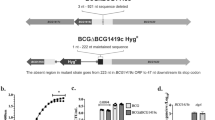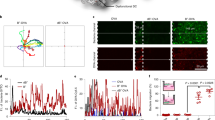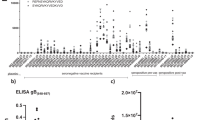Abstract
THE use of immunoadjuvants in tumour therapy is based largely on the concept that an increased level of specific immunity against tumour-associated antigens may be achieved by nonspecific stimulation of the immune system (for review see ref. 1). Among these adjuvants, Corynebacterium parvum has received much attention since it represents one of the most powerful stimulants of the reticuloendothelial system in mice2, and is effective in inhibiting tumour growth in several animal tumour systems (for example, see refs 3–6). The mechanisms by which C. parvum interferes with tumour growth have not been established and the tumour protective effect of C. parvum has not been entirely consistent in all systems studied. An immunosuppressive effect of C. parvum has been demonstrated too. In mice, the in vitro lymphoproliferative responses to mitogens and to alloantigens were depressed after injection of C. parvum. It remains to be determined, however, whether a defect measured by these general tests of T lymphocytes may also represent an indication of depressed cell-mediated immunity against tumour cells.
This is a preview of subscription content, access via your institution
Access options
Subscribe to this journal
Receive 51 print issues and online access
$199.00 per year
only $3.90 per issue
Buy this article
- Purchase on Springer Link
- Instant access to full article PDF
Prices may be subject to local taxes which are calculated during checkout
Similar content being viewed by others

References
Hersh, M., Gutterman, J. U., and Mavligit, G., Immunotherapy of Cancer in Man (Thomas, Springfield, Illinois, 1973).
Halpern, B. N., et al., J. Reticuloendothel. Soc., 1, 77–96 (1964).
Halpern, B. N., Biozzi, G., Stiffel, C., and Mouton, D., Nature, 212, 853–4 (1966).
Woodruff, M. F. A., and Boak, J. L., Br. J. Cancer, 20, 345–55 (1966).
Smith, S. E., and Scott, M. T., Br. J. Cancer, 26, 361–67 (1972).
Scott, M. T., J. natn. Cancer Inst., 53, 855–65 (1974).
Scott, M. T., Cell. Immun., 5, 459–479 (1972).
Plata, F., Cerottini, J. C., and Brunner, K. T., Eur. J. Immun., 5, 227–33 (1975).
Lavrin, D. H., Nunn, M., Soares, N., and Herberman, R. B., J. natn. Cancer Inst., 51, 1497–508 (1973).
Herberman, R. B., et al., J. natn. Cancer Inst., 53, 1103–11 (1974).
Kirchner, H., Chused, T. M., Herberman, R. B., Holden, H. T., and Lavrin, D. H., J. exp. Med., 139, 1473–87 (1974).
Holden, H. T., Kirchner, H., and Herberman, R. B., J. Immun. (in the press).
Kirchner, H., Muchmore, A. V., Chused, T. M., Holden, H. T., and Herberman, R. B., J. Immun., 114, 206–10 (1975).
Olivotto, M., and Bomford, R., Int. J. Cancer, 13, 478–88 (1974).
Author information
Authors and Affiliations
Rights and permissions
About this article
Cite this article
KIRCHNER, H., GLASER, M. & HERBERMAN, R. Suppression of cell-mediated tumour immunity by Corynebacterium parvum. Nature 257, 396–398 (1975). https://doi.org/10.1038/257396a0
Received:
Accepted:
Issue Date:
DOI: https://doi.org/10.1038/257396a0
This article is cited by
-
Studies on natural killer cell activity and the influence ofCorynebacterium parvum on murine T-cell leukemogenesis induced by butylnitrosourea
Journal of Cancer Research and Clinical Oncology (1984)
-
Effect of Corynebacterium parvum-mediated inhibition of lymphocyte proliferation on the effector-and suppressor-lymphocyte response in contact allergy
Archives of Dermatological Research (1982)
-
Interferons and bacterial infections
Klinische Wochenschrift (1982)
-
Role of natural killer cells in control of cancer metastasis
Cancer and Metastasis Review (1982)
Comments
By submitting a comment you agree to abide by our Terms and Community Guidelines. If you find something abusive or that does not comply with our terms or guidelines please flag it as inappropriate.


